One of the things I promised myself when I embarked upon this trek around Mexico, Central and South America was NO planes, unless absolutely necessary. Back in the days when it didn’t take three hours to get checked in and through security, back when the airlines actually cared about their passengers, flying was a lot more pleasant and was a real time saver. But even back then, flying was a buzz kill for anyone hoping to immerse in the local culture. Since cultural travel is all-important to me, I decided adopt a slow travel mode by using autos, trucks, boats and trains whenever possible.
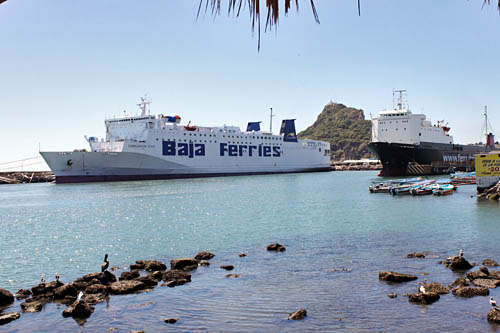
My first challenge came early in the trip. I needed to get from Mazatlan, on the west coast of Mexico’s mainland,across the Sea of Cortez to La Paz, a mid-size city halfway down the long, skinny peninsula that is the Mexican State of Baja California Sur. I quickly discovered that Baja Ferries sails between the cities and found their schedule and rates online, but even after scrutinizing their website there were many many questions left unanswered. In an attempt to help others who may wish to use the ferry, I have described more thoroughly the process below.
With the possible exception of holidays like Semana Santa, it is not necessary to buy a ticket well in advance – a day or two ahead of time will be just fine. The ticket office at the ferry terminal, located just south of the lighthouse at the inlet to Mazatlan harbor, is open seven days a week from 7 a.m. to 3 p.m. Both credit and debit cards are accepted and you will need either your original passport or a copy to buy tickets. The ship sails from Mazatlan on Monday, Wednesday and Friday at 5 p.m., and from La Paz to Mazatlan on Sunday, Tuesday, and Thursday (5 p.m. on Sunday, 8 p.m. on Tuesday and Thursday). The crossing takes about 12 hours.
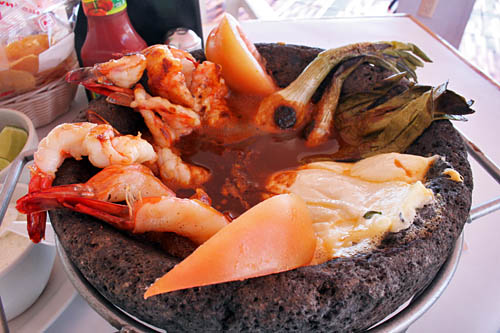
On the departure day, you may drop off your checked baggage as early as 11 a..m. and spend a few hours doing touristy things until 3 p.m., when you are expected to be in the second floor waiting room in preparation for boarding. Your luggage is tagged by an attendant, who gives you a claim check and loads it on a long luggage carrier that is towed into the bowels of the ship just before departure. (Hold onto your claim check, as it is carefully examined upon arrival.) It is worth noting that you are not allowed access to your checked luggage during the crossing, although hand luggage may be carried on, so it is wise to pack a toothbrush and toothpaste in your carry-on. If you’re hungry, I wholeheartedly suggest walking next door to the Point Restaurant, which serves excellent food and offers a splendid view of the harbor. This turned out to be the absolute best meal I had in Mazatlan, and I was even more pleased I’d eaten a big meal on shore when I later sampled the mediocre (and fairly expensive) food on board the ship.
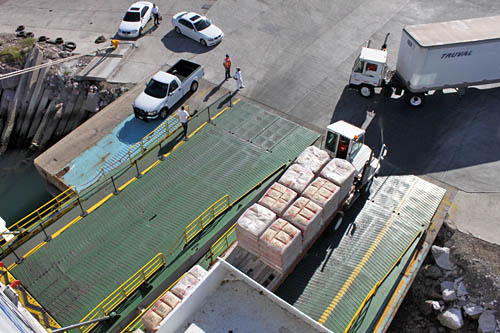
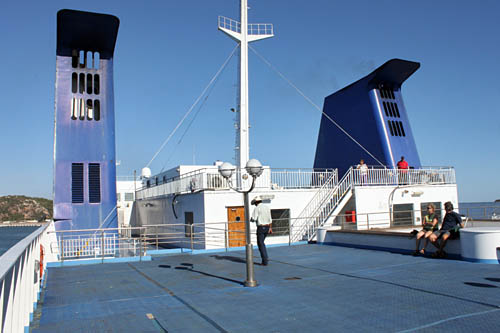
Boarding begins promptly at 3 p.m., when a ship employee arrives to escort passengers across the busy tarmac, where dozens of semi-tractor trailers are being loaded into the bowels of the ship. As soon as there is a break in the truck traffic, passengers are led into the lower deck and up four flights of stairs to check in. An elevator is available for those who cannot negotiate stairs. On the day I departed, the majority of passengers had purchased “boarding rights” passage for $1,200 pesos (slightly less than $100 U.S.). This fare included an assigned seat in one of the ship’s large “salas” – rooms outfitted with wide upholstered chairs that recline for sleeping.
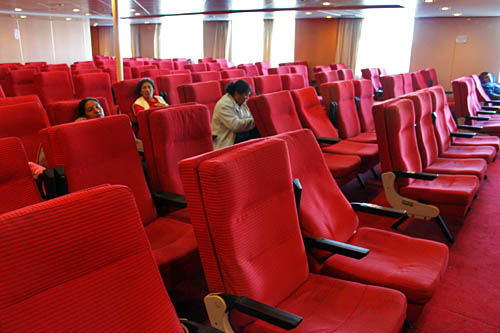
In addition, private cabins with twin beds are available for an additional 600 pesos (~$50 U.S.). I splurged on the cabin because I was concerned about falling asleep in an open sala where anyone could walk off with my backpack, laptop, all my money, etc. However, I spoke to a number of passengers who made the crossing using only the seats and was told that this is never a problem due to the extensive security on board. One major drawback to the open sala is the loud music from the nearby bar and TV lounge. A cabin, on the other hand, not only has the benefit of being more comfortable and quiet, but also has a private bathroom with shower that is equipped with soap and shampoo, eliminating the need to carry these items in your hand luggage. Cabins also have electric receptacles, should you wish to plug in a laptop or cell phone, however since the ship was built in Europe, the receptacles are 220V with European style plugs that require both a converted and an adapter.
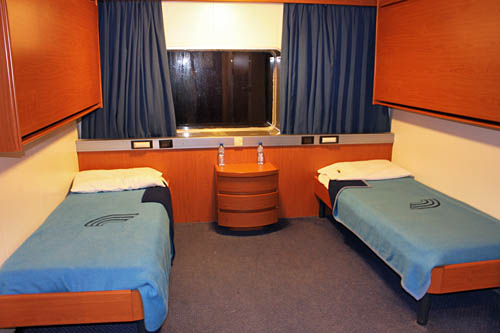
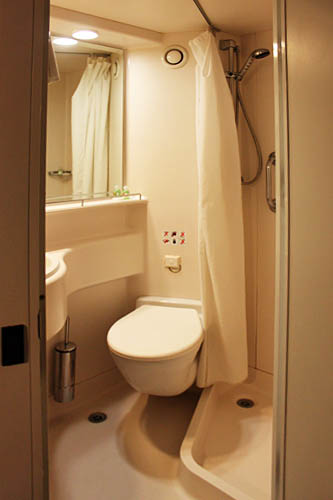
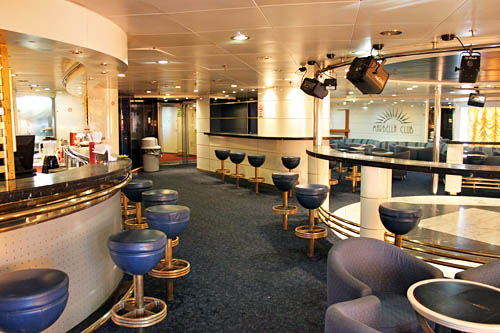
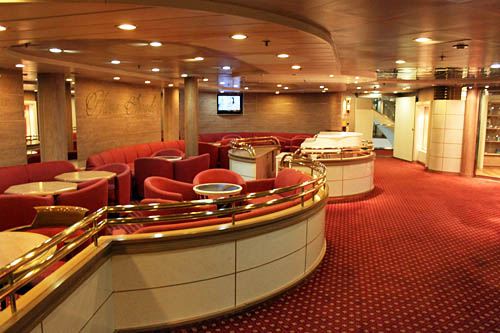
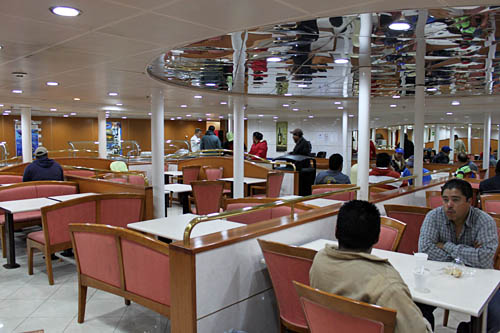
Around 6 a.m., ship’s personnel begin making announcements over the loudspeaker to ensure people are ready to disembark on time. One of the things that is not well explained on the Baja Ferries website is that the ship does not arrive at La Paz; rather it docks at the port of Pichilingue, located about 20 minutes from La Paz. We disembarked, retrieved our checked luggage from the roped-off area on the sidewalk, and joined the line to go through an inspection station manned by military personnel carrying semi-automatic weapons. As we waited, another man compared out claim tickets to the luggage we had picked from the pile. When I finally reached the inspector, he unzipped my backpack, took one look at my camera and swimsuit, and waved me through.
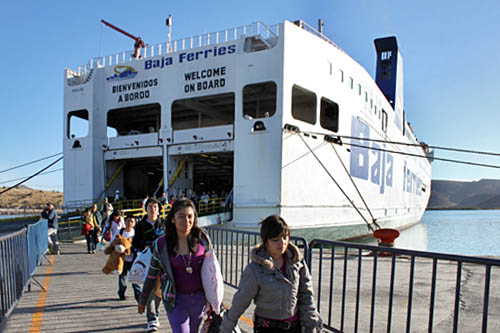
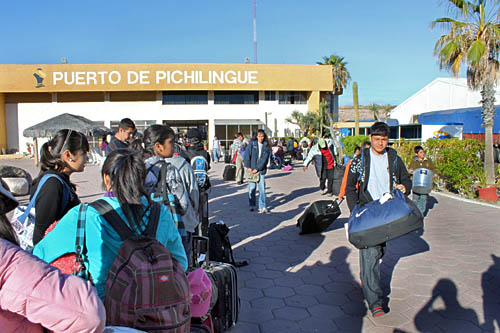
Though I had been told by ship’s personnel that I would need to hire a taxi to get to La Paz for $25-30 U.S., I discovered the trip can be done much more inexpensively in a colectivo, a van that caries up to 10 passengers (I paid $70 pesos, or about $6 U.S.). Be prepared for a short wait; colectivos do not leave until the majority of the seats have been sold, but they will drop you off anywhere in town you desire. In my case it was the bus station in El Centro, where for an additional $77 pesos I caught the bus to Todos Santos on the other side of the peninsula.
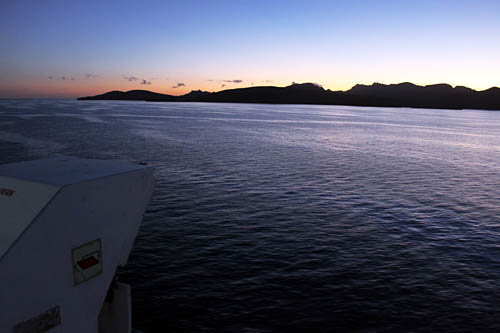
All in all, sailing with Baja Ferries was a very pleasant experience. I met some very nice Mexican folks, including a woman named Barbara (a fairly uncommon Mexican name), enjoyed a smooth sail, slept like a baby, and got up early enough to watch the tip of Baja California come into view under a full moon.


i loved the detailed description of your cruise. You are the only one who listed how long is the journey. Kudos! very interesting. Thanks.
Thanks so much Sarina. Glad you found it helpful.
I did this trip (from La Paz to Mazatlan and then back) as an 18 yr old in the early 90s. The first leg was great..highlights were the flying fish and dolphins as we approached Mazatlan. I will never forget the return trip…we had a windowless sleeper cabin and I had the worst blistering burn (compliments of Mazatlan) and case of seasickness…it was hell but my own fault. I do remember the music being loud from the bar!
He was not taking his car. He said that in his introduction. His quote was fine. Here it is today:LA PAZ – MAZATLAN – LA PAZ, Adult one-way (direct boarding) $1,190.00. Close enough.
lee i am currently in san miguel and want to move on and head to mazatlan. i have not done any research at all! i found a great place here to rent and would like info if any on finding a good deal for at least a few weeks in that area. thanks!
i’m also on facebook: patricia whalen – today is tuesday sept. 22, 2010…22nd or 23rd? no calendar lol
Nice pics, apart from the seafood one – had to skip past that before i felt queasy!! 😛
Interesting article, was wondering if you would permit me to link to it in a article i am currently writing for my own site? Charlie G. Hawkins
I am a bit behind reading your blog…plan to catch up over the next few days. Wish I could have taken the ship to Europe 😉 Even that ferry looks more comfortable than a crowded plane. Greetings from Switzerland!
When I saw the top photo of the ferry, I was feeling a little worried for you. But then the photos of the interior are lovely — especially your bathroom! It reminds me of the ferry I took from Paros to Piraeus.
You had me 100% with “no planes”. All journeys should be 2 adventures: the place, and the getting to the place. Planes rise above all that, except in the bad way.
Gorgeous ferry – a little like the one I took from Athens (or Piraeus, rather) to Crete, but a lot plusher. Although it’s weird that all ferries I’ve ever taken everywhere insist on red polka dotted carpets. What’s that all about?
You’re having so much fun that my admiration is completely swamped by narrowminded jealousy.
*shakes fist*
😉
Wish that $1000 pesos quote was correct. It’s more like $2500 pesos. This for anyone giving a thought to taking their car.
Actually Edward, we’re both right. I’m looking at the printed out schedule of prices Baja Ferries gave me on Sunday. It’s $1040 pesos from La Paz to Topolobampo (Los Mochis) where I was going, but between Laz Paz and Mazatlan it is $2440 pesos. Thanks for the correction.
You’re so right, Barbara. Flying is an inferior, joy-draining way to travel, unless you need to get there in a nano. Gorgeous photos.
Dewar Barbara:
Reading about you makes me feel REAL GOOG about ..me!
Will be sixty in October. The good part is I’ll get free rides in the Mexico City subway.
Thanks for allowing our readers enjoy your great articles. More information, here:
Best Regards,
Mario
Hi Barbara
Loved your description of the ferry experience. We live in Baja and have been talking about taking a road trip over to the mainland. Some people have told us it is possible to put your personal vehicle on the ferry. Do you know if this is true or not?
Hi J. Kassanyi: You absolutely can take your personal car on the ferry. Costs about $1,000 pesos, in addition to your regular passage and the cost of a cabin if you chose to get one rather than sleeping in the sala chairs. You cannot sleep in your car, nor can you access your vehicle for the duration of the trip.
Hi, Barbara, Several of us who live in Mazatlán have been following your blog, enjoying seeing ‘our town’ through your eyes. The name of the restaurant is La Puntilla, which, does mean The Point. La Puntilla is a favorite of Mazatlecos and tourists alike. Enjoy your continuing travels! Lee
Hi Barbara, this write-up was just excellent! It will help a lot of people to navigate that trip more easily. I have a question about the restaurant (where you ate before your departure). Could you be referring to La Puntilla which is a well-known restaurant in that area, or is this The Point restaurant affiliated with Baja Ferries and closer to their terminal? I live in Mazatlan, but can’t place the name. The dessert looks to die for, and worth a trip! Thanks again for the great write-up.
Hi Lilli: I asked the name of the restaurant and was told it was “The Point.” As you face the ferry terminal from outside the gate, just to the left is the sand road that goes to the boat to Isla de la Piedra. Go a short distance down this road and divert to the left, through the rock/sand cove where all the old fishing boats tie up, and the restaurant is just beyond that. It may well be that it is associated with Baja Ferries, since they are the ones who suggested it. And if you’re driving, there’s a big parking lot on the other side of the building. Thanks so much for reading and for leaving a comment!
What nice cabin rooms. It totally reminds me of the ferries in Italy/Croatia – much nicer than expected. I love taking ferries over planes – you meet more people and you aren’t crammed into coach! Thanks for all of the great info!
Sounded like a great trip and the ferry looked modern and totally OK! I agree to that you’ll have a more local experience going by other transports than flights. We often try to eat something before entering any ferry since it’s almost always are more expensive at the ferries.
Definitely a retweet, very useful posts for other travelers!
Great article & wonderful pictures – I would never have guessed the ferry would be so luxurious!
Love the fact that you aren’t taking planes unless absolutely necessary. I am really impressed with the ferry. Without you, I wouldn’t have known it existed! GW and I have visited Mexico many times and never stayed in a major city and I miss the people and countryside. Have a wonderful time!
Hi Barbara, your blog is really great! I have only checked out a little but know I am going to really enjoy the rest of it. Hope you found Mark okay? If you are down on the beach later or tomorrow stop in I have a small magazine you might like to have called El Calendario, published in Todos Santos.
Hi Ronna: So great to meet you.I fund Mark and have a 2 p.m. appointment. I hear he works wonders. Don’t know if I’ll make it back down the beach before I have to go, but we can stay in touch by email. I’m pretty sure I’m going to see you again, at some point.
That’s a very nice looking ferry, I’m surprised at the quality. Most of the ferries I’ve ever been on, even the larger ones didn’t have such accommodations. It’s a relaxing way to travel, I try to avoid planes when possible as well.
I LOVE, LOVE, LOVE that you aren’t taking airplanes on this trip. The ferry looks really comfortable. I wouldn’t mind spending the night on it.